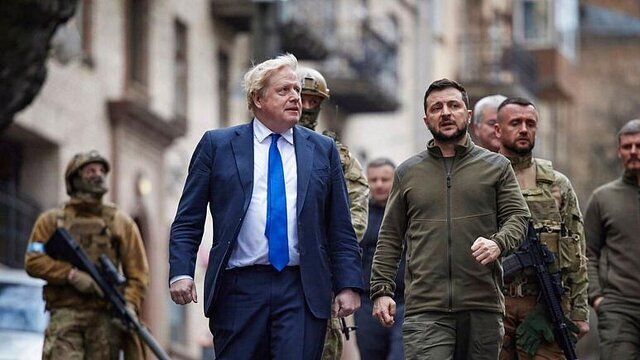Morteza Makki told the Strategic Council on Foreign Relations that Britain is playing an active role in the Ukrainian crisis and taking anti-Russian stances and sending arms and military equipment and imposing sanctions on Russia.
He said that the British government has had ups and downs with Russia, and its alignment with the United States and its transatlantic views also play a role in its current stance on Moscow.
Referring to the hard positions of the UK towards Russia’s confrontation with political opponents, he said that prior to the Russian invasion of Ukraine, relations between Moscow and London were not normal, and the two sides always looked at each other with skepticism and negativity; There were even cases of expelling diplomats from the other side of the country.
Makki said that Russian news agencies have previously reported that about 20 members of the British Special Air Service are stationed in western Ukraine near the Polish border, suggesting a possible presence as a NATO member, and Russia claims the presence and sabotage of British special forces in Ukraine have been against Russia.
He said that Britain’s withdrawal from the European Union and the views that Britain pursues towards a global Britain have led it to try to play a different role than other European governments, especially France and Germany, in the face of the Ukraine crisis.
“Britain is more energy independent than France and Germany, and can more easily have a clearer and more frank view of Ukraine”, he said, adding that Britain is well aware that it needs the support of the United States if it is to influence global security and political equations and map the world. For this reason, there is coordination and cooperation between Johnson and Biden in the types of threats and pressures they place on the Russian government and Putin.
He said the US and UK have complex and close relations and are aligned in confronting the crisis in Ukraine, adding that Russia has posed a serious challenge to the set of Western countries.
Makki said that although the economic and political-security equations of the world have changed and Europeans do not have common views on all issues and cannot make tough decisions to impose economic sanctions on Russia, the more active Britain is, the more it can play a role in putting pressure on Russia.
He added that given that Putin is trapped in a serious quagmire in Ukraine and it seems very difficult to get out of it, Russia has suffered serious economic damage. In contrast, it has created a special opportunity for transatlantic countries to strengthen NATO cohesion.
“In such a situation, European governments can no longer pursue an independent defense mechanism; Because it will have high costs and in terms of agility and the possibility of being in other countries, they cannot have a function like NATO.”
Referring to the recent visit by UK Prime Minister Boris Johnson to Ukraine and criticism of Macron to this visit, he said that the media recently reported that London was concerned that other NATO allies would force Ukraine to resolve the conflict with Russia as soon as possible; London, meanwhile, rejects any idea of signing a peace deal with Russia, insisting that Kiev should negotiate in the strongest possible position. That is why we are witnessing the widespread and obvious sending of all kinds of weapons by Britain to Ukraine.
Makki said that Britain has not been inactive in plunging Russia into the quagmire, and its extremist policies toward Russia and its support for Ukraine and Georgia’s NATO membership have not been ineffective in inciting Russia to invade Ukraine.
Asked about the prospects of relations between the UK and Russia especially in political, commercial and economic terms, he said that the Ukraine crisis has changed many political and security equations, and Russia’s relations with the West and Britain can no longer be analyzed in the same way as in the past. The sanctions imposed on Russia will not be easily lifted, and European countries will certainly make the most of the hoax they have imposed on Russia to weaken, limit and restrain it within its borders.
According to this expert of European affairs, has a special place in this situation, because it can easily align with the United States. As Russia’s power in the world and in Europe diminishes, the role of Britain and NATO, and London’s influence on European developments becomes greater.
Referring to UK efforts to strengthen anti-Russian positions of countries and British visits and consultations with other countries such as India, he said India supplies most of its military weapons from Russia, and in recent days has rejected Western demands to limit its bilateral relations with Moscow in response to Russia’s invasion of Ukraine and has been criticized by Western countries.
“Under such circumstances, the British prime minister traveled to India and announced that his country was embarking on a “new and broader” chapter in its defense and security partnership with India, which would be a commitment for decades to come,” he said.










0 Comments